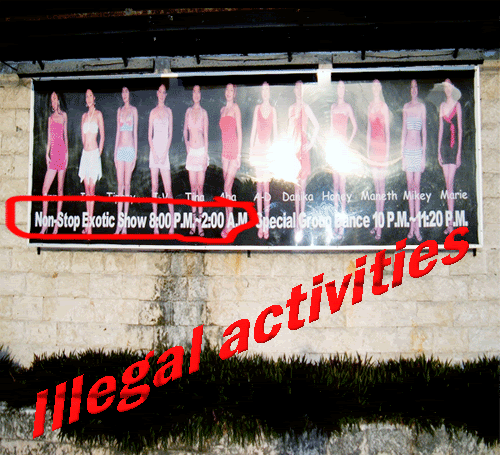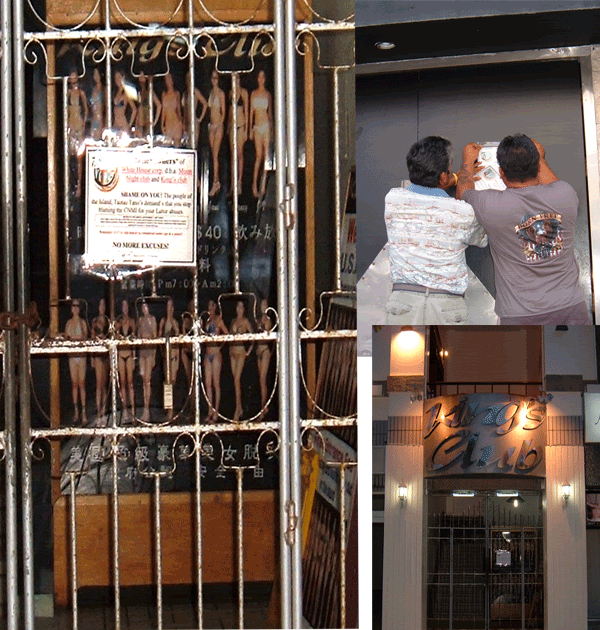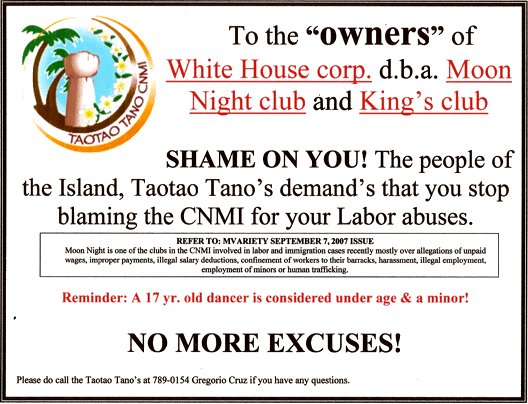Signing of HB 15-38 into law - PL 15-108
Links
While law In Process
Guest Workers
Dekada Movement counsel Stephen Woodruff
BENEDETTO
TINA SABLAN & Propts movement
Indigenous Community Opinion
TAOTAO TANO OPINION
TAOTAO TANO Follow up
- Next meeting: 040208
- 032108 Taotao Tano attends secret meeting on CNMI Residency
Sunday, November 18, 2007
Variations: Déjà vu all over again
mv-Monday November 19, 2007
By Zaldy Dandan
Variety Editor
AT least two lawyers familiar with CNMI labor issues have come out with a detailed critique of the latest labor “reform” law which Capital Hill enacts every time the feds threaten to end the governor’s control over local immigration. The administration’s rebuttal can be summed up in two words: “They’re wrong.” Why? Because.
The administration likes to point out that this measure has been reviewed many times. Now what does that mean? A lot of scientists can repeatedly analyze a mound of cow crap — but will that turn it into gold? The administration also considers the unanimous passage of the bill as one of its merits. And yes we are talking about the same Legislature whose other legislative masterpieces the governor had to veto. Lawmakers, as we all know, will pass anything that will keep them in office. This labor “reform” law was packaged as a “pro-local workers” measure that will also end the “abuse” of the system perpetrated by “abusive guest workers.” How do you vote “no” to that?
But as one of the law’s critics noted, the proponents of this law say one thing while their handiwork says something else.
Here’s my own question to the ordinary citizens who would like to give this law the benefit of their doubt: Do the administration and Legislature have any credibility in drafting and enforcing labor and immigration laws that actually do what they’re supposed to do? Here’s another question. Whatever happened to the previous stay-limit laws and other reform measures they enacted in the past?
Precedent and the track record of the CNMI government doom this new law.
Its enactment is partly premised on the hope that U.S. lawmakers are afflicted with amnesia and will, once again, believe that this time, really!, the CNMI government will no longer repeal its own reform laws, not this time, really!
Its authors say this latest reform measure is an excellent law. They’re probably right. They could have also pointed out that the CNMI has other well-meaning and beautiful laws. Like those that guarantee your tax rebates, mandate a balanced budget, the retirement of the deficit, and the prioritization of public education. The CNMI, moreover, has an exquisite Code of Ethics and procurement regulations that prohibit conflicts of interest and irregularities in government contracts. It has, lest we forget, splendid labor laws that give preference to local applicants and a community college that was established to end the CNMI’s reliance on guest workers.
Not surprisingly, the government has no money for your tax rebates, is unwilling to pass a new budget, has a runaway deficit, and is notorious for its questionable procurements and contracts. The private sector remains heavily dependent on guest workers while public school PTAs, teachers and students have to raise funds to buy toilet paper and other school supplies.
As for the unemployed local residents who see this new “reform” law as the answer to their prayers — well, it is, like the CUC veto override. See, now all of us will pay a power rate higher than what CUC charged before lawmakers overrode the veto.
Sure, the government can pass as many labor “reform” laws it wants, but can these compel a local family man to work for low wages, or force a company to hire workers who can’t do the job?
The problem, as we should all realize by now, is not the labor law, but the implementing agency, and the kind of economy on which it is imposed.
The governor’s statements after signing the law weren’t exactly reassuring. After admitting that the law will give businesses a hard time in these difficult times, he said he will personally oversee its enforcement, which indicates that the implementing regs will be more “flexible.” Probably depending on who the businessman is.
Therein lies the problem with CNMI labor and immigration rules. There is no consistency in their implementation and their selective application depends on whoever the governor is. Hence once a new leadership takes over on Capital Hill, who can guarantee that there won’t be another “reform” law that better suits the political needs of the new politicians in power?
And what does all this say to investors? “See, Saipan doesn’t need a casino. Doing business here is already like gambling because you don’t know what the labor and immigration laws will be and how they will be implemented.”
The economy has to improve so it can generate new and better paying jobs for local residents. But it will not improve if basic laws are unstable. And these laws will never be stable as long as they are held hostage to the short-term political needs of whoever is temporarily in power.
By Zaldy Dandan
Variety Editor
AT least two lawyers familiar with CNMI labor issues have come out with a detailed critique of the latest labor “reform” law which Capital Hill enacts every time the feds threaten to end the governor’s control over local immigration. The administration’s rebuttal can be summed up in two words: “They’re wrong.” Why? Because.
The administration likes to point out that this measure has been reviewed many times. Now what does that mean? A lot of scientists can repeatedly analyze a mound of cow crap — but will that turn it into gold? The administration also considers the unanimous passage of the bill as one of its merits. And yes we are talking about the same Legislature whose other legislative masterpieces the governor had to veto. Lawmakers, as we all know, will pass anything that will keep them in office. This labor “reform” law was packaged as a “pro-local workers” measure that will also end the “abuse” of the system perpetrated by “abusive guest workers.” How do you vote “no” to that?
But as one of the law’s critics noted, the proponents of this law say one thing while their handiwork says something else.
Here’s my own question to the ordinary citizens who would like to give this law the benefit of their doubt: Do the administration and Legislature have any credibility in drafting and enforcing labor and immigration laws that actually do what they’re supposed to do? Here’s another question. Whatever happened to the previous stay-limit laws and other reform measures they enacted in the past?
Precedent and the track record of the CNMI government doom this new law.
Its enactment is partly premised on the hope that U.S. lawmakers are afflicted with amnesia and will, once again, believe that this time, really!, the CNMI government will no longer repeal its own reform laws, not this time, really!
Its authors say this latest reform measure is an excellent law. They’re probably right. They could have also pointed out that the CNMI has other well-meaning and beautiful laws. Like those that guarantee your tax rebates, mandate a balanced budget, the retirement of the deficit, and the prioritization of public education. The CNMI, moreover, has an exquisite Code of Ethics and procurement regulations that prohibit conflicts of interest and irregularities in government contracts. It has, lest we forget, splendid labor laws that give preference to local applicants and a community college that was established to end the CNMI’s reliance on guest workers.
Not surprisingly, the government has no money for your tax rebates, is unwilling to pass a new budget, has a runaway deficit, and is notorious for its questionable procurements and contracts. The private sector remains heavily dependent on guest workers while public school PTAs, teachers and students have to raise funds to buy toilet paper and other school supplies.
As for the unemployed local residents who see this new “reform” law as the answer to their prayers — well, it is, like the CUC veto override. See, now all of us will pay a power rate higher than what CUC charged before lawmakers overrode the veto.
Sure, the government can pass as many labor “reform” laws it wants, but can these compel a local family man to work for low wages, or force a company to hire workers who can’t do the job?
The problem, as we should all realize by now, is not the labor law, but the implementing agency, and the kind of economy on which it is imposed.
The governor’s statements after signing the law weren’t exactly reassuring. After admitting that the law will give businesses a hard time in these difficult times, he said he will personally oversee its enforcement, which indicates that the implementing regs will be more “flexible.” Probably depending on who the businessman is.
Therein lies the problem with CNMI labor and immigration rules. There is no consistency in their implementation and their selective application depends on whoever the governor is. Hence once a new leadership takes over on Capital Hill, who can guarantee that there won’t be another “reform” law that better suits the political needs of the new politicians in power?
And what does all this say to investors? “See, Saipan doesn’t need a casino. Doing business here is already like gambling because you don’t know what the labor and immigration laws will be and how they will be implemented.”
The economy has to improve so it can generate new and better paying jobs for local residents. But it will not improve if basic laws are unstable. And these laws will never be stable as long as they are held hostage to the short-term political needs of whoever is temporarily in power.
Subscribe to:
Post Comments (Atom)









No comments:
Post a Comment